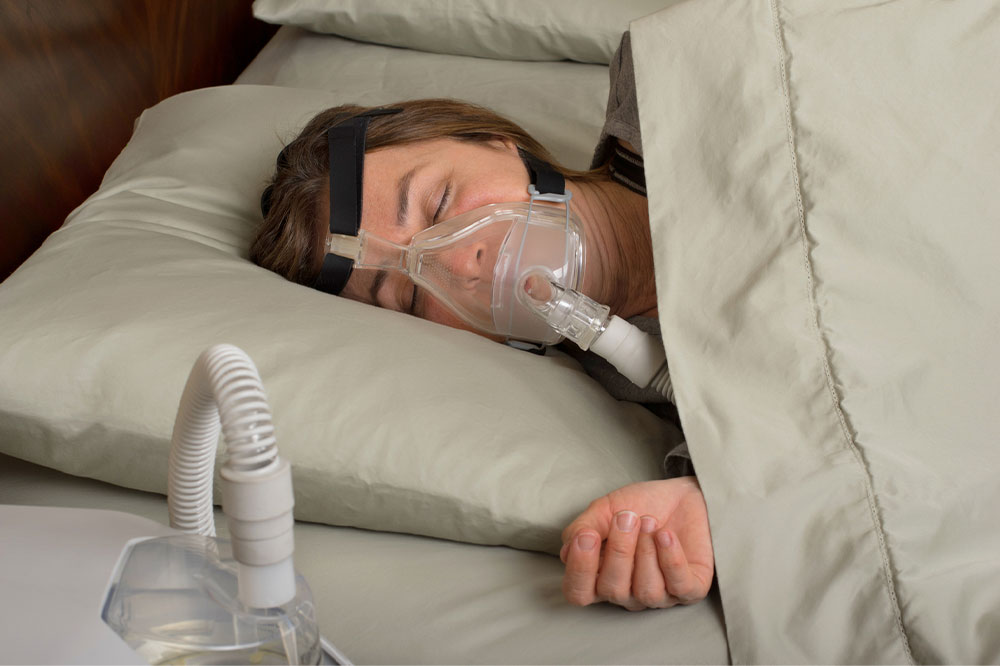
Sleep apnea – Causes, symptoms, and management options
Sleep apnea is a common disorder that makes it difficult to get a good night’s rest. About 1 billion people in the world have some form of sleep apnea. Here, the breathing stops and resumes at night repeatedly, making one feel tired often. While the condition can affect anyone, men are more likely to experience sleep-disordered breathing than women. However, one can seek treatment to manage the symptoms and get enough sleep.
Causes
Sleep apnea is characterized by breathing disruptions during sleep, ranging from shallow breathing to complete cessation of breathing. This can cause various symptoms and health problems. While there is no single cause of sleep apnea, several factors contribute to its development.
- A family history of sleep apnea increases the risk of developing the condition.
- An underactive thyroid gland can lead to an increase in body mass and contribute to sleep apnea.
- Large tonsils and adenoids can obstruct the airway during sleep, leading to breathing difficulties.
- Certain neurological conditions can contribute to the development of sleep apnea, including stroke and Parkinson’s disease.
- Allergies can cause nasal congestion and other breathing issues, increasing the risk of sleep disorders.
- Upper respiratory infections, like the common cold, can cause congestion and swelling in the nasal passages, leading to breathing difficulties during sleep.
Symptoms
Sleep apnea develops when breathing repeatedly stops and starts during sleep, leading to poor sleep quality. While some people experience mild symptoms, others may experience severe and life-altering effects. Here are some of the common symptoms:
- Snoring loudly and persistently
- Gasping for air during sleep
- Choking during sleep
- Pauses in breathing while sleeping
- Daytime fatigue and sleepiness
- Morning headaches
- Irritability and mood swings
- Difficulty concentrating
- Dry mouth and sore throat upon waking
Identifying the causes of such symptoms and seeking medical care can help one manage these symptoms. One should not ignore these signs, as timely treatment can help one get adequate rest and improve their overall quality of life.
Diagnosis
When one observes one or more persistent symptoms of sleep apnea, they should get a diagnosis. Here are the key ways of determining if one has this sleep disorder:
Medical history: A healthcare provider will begin by examining the medical history and asking questions regarding their sleep habits and symptoms.
Physical examination: A physical examination helps determine whether there are any physical issues that may cause sleep apnea symptoms.
Sleep study: A sleep study (polysomnography) is often required to definitively diagnose sleep apnea. First, the patient is hooked to sensors that monitor their heart rate, brain activity, and breathing. During the study, the patient sleeps while sensors monitor these parameters and other bodily functions. The test results will assist the doctor in establishing the type and severity of sleep apnea and determining the appropriate treatment options.
Home sleep test: This is also an option for confirming if one has sleep apnea. The test involves wearing a small device on your finger or wrist that monitors the breathing patterns while one sleeps.
By working with a healthcare provider and undergoing the necessary diagnostic tests, one can get a definitive diagnosis of sleep apnea. Following this, they start taking steps to treat and manage the condition for better sleep quality and overall health.
Treatment options
Once diagnosed with sleep apnea, one must explore different treatment options to address the issue. Here are a few treatments to consider:
Continuous positive airway pressure (CPAP): A popular treatment option for sleep apnea, a CPAP machine delivers a continuous flow of air to the airways through a mask, which keeps them open when asleep. This helps prevent breathing pauses that are characteristic of this sleep disorder.
Oral appliances: Another option for treating the disorder is to use oral appliances that keep the airways open by repositioning the tongue and jaw while one sleeps. There are many types of oral appliances, so it is essential to work with a doctor to find the right one for you.
Surgery: For people with severe sleep apnea or those who have not had success with other treatment options, surgery may be the best option. Several different surgical options could work, including removing excess tissue from the throat or implanting a device that stimulates the airway muscles to keep them open.
Everyone’s experience with sleep disorders can be different, so what works for one person may not work for another. Choosing the most suitable treatment option requires consultations with a physician or specialist. The doctor can come up with a treatment plan based on the severity of the sleep apnea and individual preferences.




